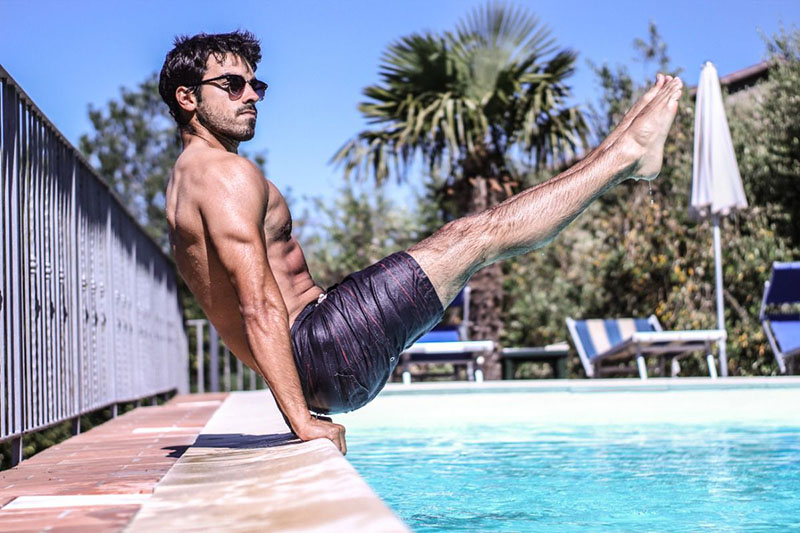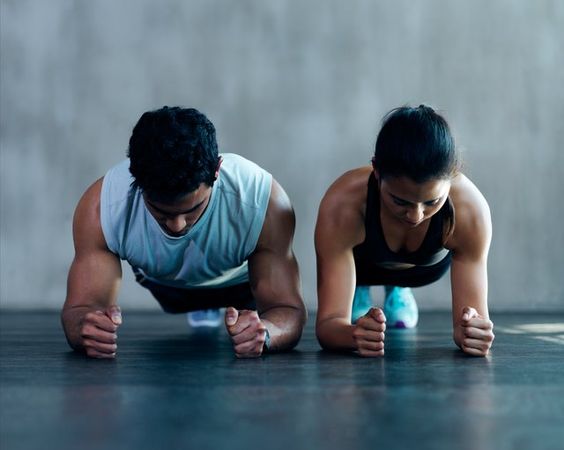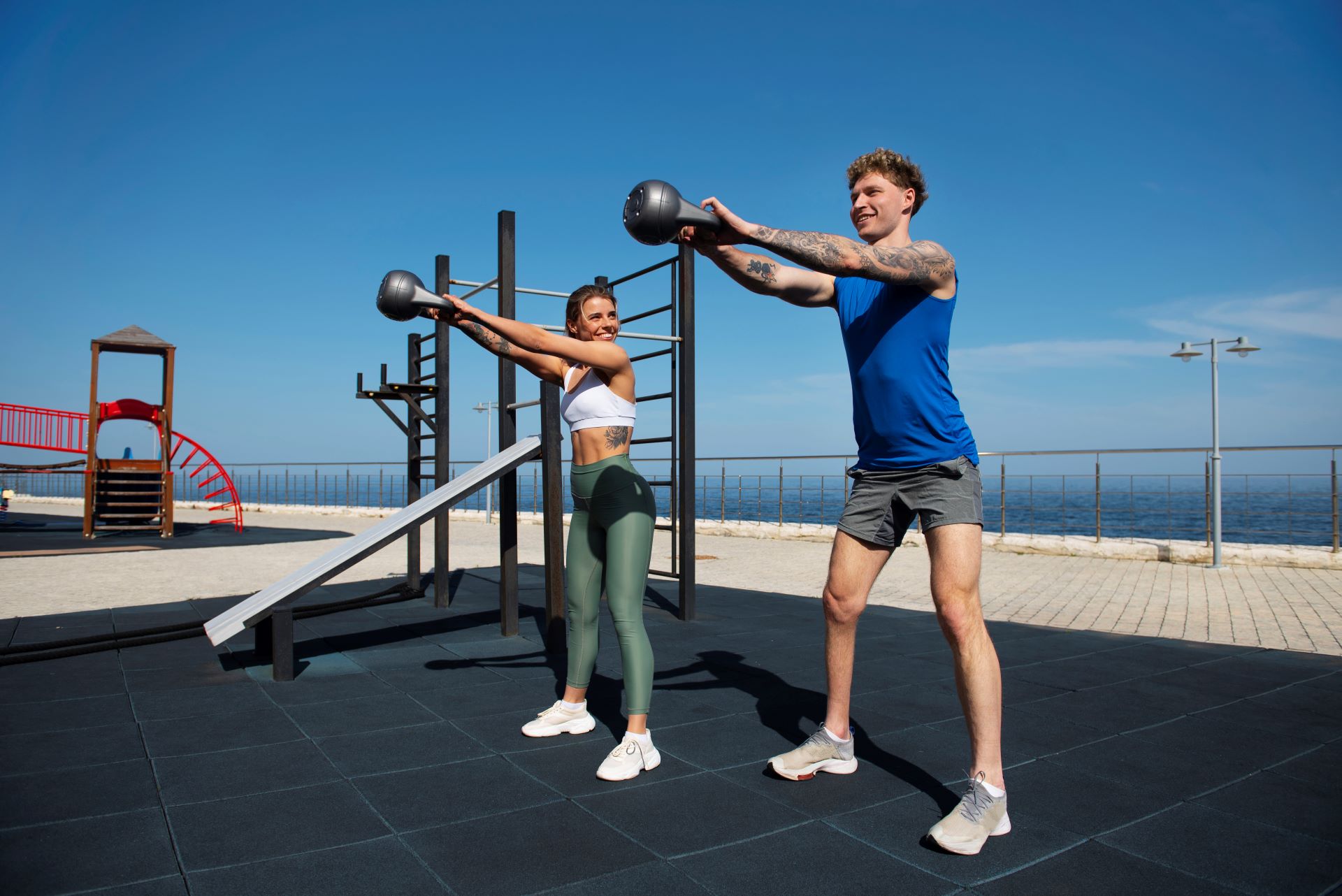Weight training and calisthenics have gained immense popularity in recent years, with athletes and fitness enthusiasts alike embracing their numerous benefits. These two exercise modalities, while distinct in their approach, can be synergistically combined to create a well-rounded fitness routine that can help swimmers achieve their performance goals.

Calisthenics has Grown in Popularity among Swimmers
Weight Training: Building Strength and Muscle
Weight training, also known as resistance training, involves the use of external weights to create resistance against which the muscles work. This type of exercise is highly effective in building muscle mass, strength, and endurance.

This type of exercise is highly effective in building muscle mass, strength, and endurance.
When muscles are subjected to resistance, they experience micro-tears. The body then repairs these tears, making the muscles stronger and more resilient over time. This process of muscle adaptation is essential for swimmers, as it allows them to generate more power and propulsion in the water.
In addition to building muscle, weight training can also boost metabolism, enhance bone health, and improve physical performance overall.
Calisthenics: Bodyweight Exercises for Functional Fitness
Calisthenics refers to a wide range of bodyweight exercises that utilize the individual’s own body weight as resistance. These exercises are often performed with minimal or no equipment, making them accessible and convenient.

Calisthenics can also help swimmers improve their body awareness, balance, and coordination.
Calisthenics exercises are designed to improve functional strength, flexibility, and mobility. They target all major muscle groups, helping to develop a balanced and symmetrical physique.
Calisthenics can also help swimmers improve their body awareness, balance, and coordination. These qualities are essential for efficient and effective swimming.
Read more: Front Crawl Swimming for Beginners: Essential Tips
Key Benefits of Weight Training and Calisthenics for Swimmers
Weight training and calisthenics offer a myriad of benefits for swimmers, including:
- Increased muscle mass and strength: Weight training helps to build lean muscle mass, which is essential for generating power and propulsion in the water. Calisthenics exercises such as pull-ups, push-ups, and dips also target major muscle groups, contributing to overall strength and power.
- Improved endurance: Weight training and calisthenics can help to improve cardiovascular fitness and muscular endurance. This is important for swimmers, as it allows them to maintain a high level of performance for longer periods of time.
- Reduced risk of injury: Strong muscles and connective tissues help to protect the body from injury. Weight training and calisthenics can help to strengthen these tissues, reducing the risk of injuries such as shoulder impingement, rotator cuff tears, and lower back pain.
- Improved functional fitness: Weight training and calisthenics exercises are designed to mimic everyday movements, such as lifting, pushing, and pulling. This type of training can help swimmers improve their functional fitness and overall performance in daily activities.
Combining Weight Training and Calisthenics
Combining weight training and calisthenics can create a well-rounded fitness routine that can help swimmers achieve their performance goals. Weight training can help to build muscle mass and strength, while calisthenics can improve functional fitness and mobility.

Combining weight training and calisthenics can create a well-rounded fitness routine that can help swimmers achieve their performance goals.
A typical training routine for swimmers may include a combination of weight training exercises such as squats, deadlifts, bench press, and rows, along with calisthenics exercises such as pull-ups, push-ups, dips, and lunges.
Overcoming Challenges and Staying Safe
Common challenges faced by swimmers when incorporating weight training and calisthenics into their fitness routine include:
- Time constraints: Swimmers often have busy training schedules, which can make it difficult to find time for additional workouts. However, even short workouts can be effective, especially if they are well-designed and targeted.
- Injury prevention: It is important to use proper form and technique when performing weight training and calisthenics exercises to reduce the risk of injury. If you are unsure about how to perform an exercise, ask a qualified personal trainer for assistance.
Conclusion
Weight training and calisthenics offer a myriad of benefits for swimmers, helping to improve muscle mass, strength, endurance, functional fitness, and injury prevention. By combining these two exercise modalities, swimmers can create a well-rounded fitness routine that can help them achieve their performance goals.
Additional Resources: 30-Minute Strength Training at Home: Quick and Effective Workouts for Busy Individuals
AUTHOR
Sang Nguyen
Sang Nguyen is a former national swimmer for Vietnam who has transitioned into coaching. With a passion for fostering a healthy swimming community and connecting like-minded individuals,......Read More
BLOG
Maybe You Are Interested
Good Swim Meet Snacks: What to Eat for Optimal Performance
Good nutrition is crucial for swimmers to maintain energy, recover quickly, and perform at their...
Read More...Optimizing Your Performance: The Best Diet for Swimming Training
Optimizing your performance in swimming is not just about rigorous training; it’s equally crucial to...
Read More...Achieve Peak Performance with This Diet Chart for Swimmers
Whether you’re a novice or an expert swimmer, understanding the right diet is crucial for...
Read More...Eating Like a Champion: Exploring the Diet of Michael Phelps
Michael Phelps, renowned for his Olympic triumphs, has a diet as extraordinary as his swimming...
Read More...Muscle Gain for Swimmers: Tailoring Your Diet for Strength
Swimming is a demanding sport that requires a tailored approach to nutrition to support muscle...
Read More...A Comprehensive Diet Plan To Gain Weight For Swimmers
Swimming is a demanding sport that requires meticulous attention to nutritional needs to optimize performance,...
Read More...